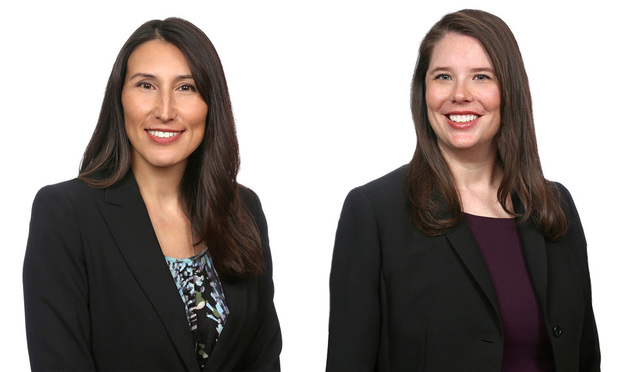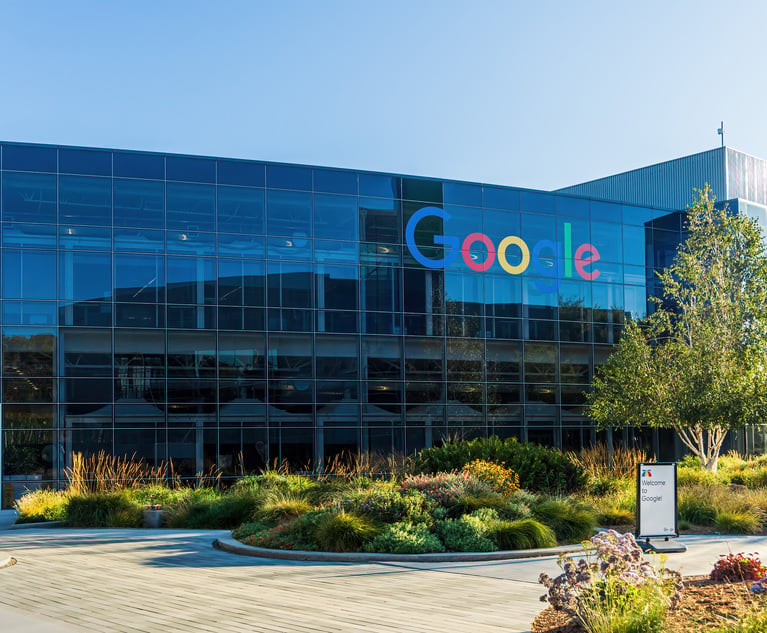New Ethical Rules Governing Attorney Advertising
Attorney advertising is not a matter of "anything goes." Instead, the ethical rules contain limitations on attorney advertising practices, which can at times be confusing in light of the many new advertising methods available to attorneys.
September 03, 2019 at 06:47 PM
6 minute read
 Shari Klevens, left, and Alanna Clair, Dentons. Courtesy photo
Shari Klevens, left, and Alanna Clair, Dentons. Courtesy photo
As with any other industry, attorneys are always looking for new ways to attract more business and to develop greater name recognition. In today's age, new technologies allow attorneys to target potential clients and advertise their services in creative and unprecedented ways.
However, attorney advertising is not a matter of "anything goes." Instead, the ethical rules contain limitations on attorney advertising practices, which can at times be confusing in light of the many new advertising methods available to attorneys.
Recently, the ABA approved changes to the Model Rules of Professional Conduct governing attorney advertising that are intended to modernize the rules and are a response to prevailing concerns among attorneys. Certain states have already adopted the new amendments, while many others are in the process of considering whether to adopt some or all of the proposed changes. Accordingly, the amended Model Rules provide an indication of how states may respond to the new and ever-changing methods of attorney advertising.
Policy Considerations
Unlike other sources of bar complaints, the ABA's data indicated that bar complaints regarding an attorney's improper advertising were often coming from other lawyers complaining about their competitors, and not coming from affected clients or potential clients. Those findings suggested that, although the attorney advertising rules are intended to protect the public, it is possible that attorneys were using these rules defensively against other members of the bar.
The ABA further noted that if the rules on advertising are too limiting, it can have a detrimental impact on both attorneys and the general public. Indeed, if attorneys fail to advertise their services because the rules are drawn too narrowly (or because attorneys are concerned about violating those rules), the bar may be depriving the public the ability to find available legal services. If attorneys are unable to reach potential clients, those potential clients could end up going without legal representation that could be of great assistance.
At the same time, undue restrictions on an attorney's ability to advertise her or his legal services could adversely impact that attorney's efforts to find new clients. Particularly for attorneys who are newer to the bar, the inability to advertise for new clients can be critical.
New Rules on Misleading Statements
One core tenet of the rules governing attorney advertising is the prohibition on any misleading statements. The Model Rules, as revised, reinforce that attorneys may not make misleading statements about their firms, including in their letterheads.
In an apparent effort to streamline the rules prohibiting false or misleading statements, the ABA eliminated certain rules and consolidated their provisions under a single rule, Rule 7.1. In particular, Model Rule 7.5 previously governed a law firm's use of firm names and letterheads, noting that a lawyer could not adopt a misleading firm name or professional designation. The ABA decided to eliminate that rule and relegated its contents to a comment to Rule 7.1.
Comment 5 to Model Rule 7.1 now provides that "Firm names, letterhead and professional designations are communications concerning a lawyer's services." The comment goes on to clarify what could make a firm name "misleading" under Model Rule 7.1, such as an implied connection with a government agency, with a lawyer not associated with the firm (or a predecessor firm), or with a public or charitable legal services organization.
The ABA thus decided that a separate rule governing firm names was unnecessary, but instead could be addressed as part of the overall requirement of attorneys under Model Rule 7.1 not to mislead the public.
The Definition of "Advertise"
Model Rule 7.2 previously stated that, subject to the requirements on honesty, a "[l]awyer may advertise information regarding the lawyer's services." For some attorneys and firms, the definition of "advertise" became controversial. Questions were raised regarding whether "advertise" included a social media post about a successful outcome for a client, or perhaps an article describing an attorney's experience with a specific legal issue.
The ABA addressed those concerns by amending the word "advertise" to "communicate" in Model Rule 7.2, which now provides that "[a] lawyer may communicate information regarding the lawyer's services through any media." Thus, the Rule avoids the issue of whether a communication qualifies as an advertisement but instead appears to permit any form of communication, subject to the requirement that it not be misleading.
Permitted Solicitation Methods
Because the rule on advertising may not always be intuitive, it is helpful to consult the local rules before acting. Attorney solicitations in particular have been treated differently by jurisdictions, many of which apply something of a "know it when you see it" approach. Many jurisdictions likewise have strict rules regarding when and under what circumstances an attorney may "solicit" a potential client.
To help provide clarity on the issue, the ABA amended Model Rule 7.3(a) to actually define solicitation. The rule now provides that "'[s]olicitation' or 'solicit' denotes a communication initiated by or on behalf of a lawyer or law firm that is directed to a specific person the lawyer knows or reasonably should know needs legal services in a particular matter and that offers to provide, or reasonably can be understood as offering to provide, legal services for that matter."
The revised rules also appear to permit in-person solicitation of sophisticated clients. Indeed, although a lawyer is generally not permitted to solicit professional employment in person, amended Model Rule 7.3 permits such contact directly to lawyers, to those who have a relationship with the lawyer, or to a person "who routinely uses for business purposes the type of legal services offered by the lawyer." Although attorneys still may not use coercion or harassment and may not solicit those who have made it clear they do not want to be solicited, these changes recognize that there is less concern where the client is sophisticated and has the ability to determine whether the contact should continue.
Thus, for attorneys in jurisdictions that adopt the new rules, it will be helpful to review the rules to assess their impact.
Shari L. Klevens is a partner at Dentons US and serves on the firm's US Board of Directors. She represents and advises lawyers and insurers on complex claims, is co-chair of Dentons' global insurance sector team, and is co-author of "California Legal Malpractice Law" (2014). Alanna Clair is a partner at Dentons US and focuses on professional liability defense. Shari and Alanna are co-authors of "The Lawyer's Handbook: Ethics Compliance and Claim Avoidance."
This content has been archived. It is available through our partners, LexisNexis® and Bloomberg Law.
To view this content, please continue to their sites.
Not a Lexis Subscriber?
Subscribe Now
Not a Bloomberg Law Subscriber?
Subscribe Now
NOT FOR REPRINT
© 2025 ALM Global, LLC, All Rights Reserved. Request academic re-use from www.copyright.com. All other uses, submit a request to [email protected]. For more information visit Asset & Logo Licensing.
You Might Like
View All
How We Won: BraunHagey’s $56M Trademark Win Over Molson Coors Upheld by 9th Circuit
8 minute read
'Water Cooler Discussions': US Judge Questions DOJ Request in Google Search Case
3 minute read
Judge to Hear Arguments on Whether Google's Advertising Tech Constitutes a Monopoly
3 minute readTrending Stories
- 1No Two Wildfires Alike: Lawyers Take Different Legal Strategies in California
- 2Poop-Themed Dog Toy OK as Parody, but Still Tarnished Jack Daniel’s Brand, Court Says
- 3Meet the New President of NY's Association of Trial Court Jurists
- 4Lawyers' Phones Are Ringing: What Should Employers Do If ICE Raids Their Business?
- 5Freshfields Hires Ex-SEC Corporate Finance Director in Silicon Valley
Who Got The Work
J. Brugh Lower of Gibbons has entered an appearance for industrial equipment supplier Devco Corporation in a pending trademark infringement lawsuit. The suit, accusing the defendant of selling knock-off Graco products, was filed Dec. 18 in New Jersey District Court by Rivkin Radler on behalf of Graco Inc. and Graco Minnesota. The case, assigned to U.S. District Judge Zahid N. Quraishi, is 3:24-cv-11294, Graco Inc. et al v. Devco Corporation.
Who Got The Work
Rebecca Maller-Stein and Kent A. Yalowitz of Arnold & Porter Kaye Scholer have entered their appearances for Hanaco Venture Capital and its executives, Lior Prosor and David Frankel, in a pending securities lawsuit. The action, filed on Dec. 24 in New York Southern District Court by Zell, Aron & Co. on behalf of Goldeneye Advisors, accuses the defendants of negligently and fraudulently managing the plaintiff's $1 million investment. The case, assigned to U.S. District Judge Vernon S. Broderick, is 1:24-cv-09918, Goldeneye Advisors, LLC v. Hanaco Venture Capital, Ltd. et al.
Who Got The Work
Attorneys from A&O Shearman has stepped in as defense counsel for Toronto-Dominion Bank and other defendants in a pending securities class action. The suit, filed Dec. 11 in New York Southern District Court by Bleichmar Fonti & Auld, accuses the defendants of concealing the bank's 'pervasive' deficiencies in regards to its compliance with the Bank Secrecy Act and the quality of its anti-money laundering controls. The case, assigned to U.S. District Judge Arun Subramanian, is 1:24-cv-09445, Gonzalez v. The Toronto-Dominion Bank et al.
Who Got The Work
Crown Castle International, a Pennsylvania company providing shared communications infrastructure, has turned to Luke D. Wolf of Gordon Rees Scully Mansukhani to fend off a pending breach-of-contract lawsuit. The court action, filed Nov. 25 in Michigan Eastern District Court by Hooper Hathaway PC on behalf of The Town Residences LLC, accuses Crown Castle of failing to transfer approximately $30,000 in utility payments from T-Mobile in breach of a roof-top lease and assignment agreement. The case, assigned to U.S. District Judge Susan K. Declercq, is 2:24-cv-13131, The Town Residences LLC v. T-Mobile US, Inc. et al.
Who Got The Work
Wilfred P. Coronato and Daniel M. Schwartz of McCarter & English have stepped in as defense counsel to Electrolux Home Products Inc. in a pending product liability lawsuit. The court action, filed Nov. 26 in New York Eastern District Court by Poulos Lopiccolo PC and Nagel Rice LLP on behalf of David Stern, alleges that the defendant's refrigerators’ drawers and shelving repeatedly break and fall apart within months after purchase. The case, assigned to U.S. District Judge Joan M. Azrack, is 2:24-cv-08204, Stern v. Electrolux Home Products, Inc.
Featured Firms
Law Offices of Gary Martin Hays & Associates, P.C.
(470) 294-1674
Law Offices of Mark E. Salomone
(857) 444-6468
Smith & Hassler
(713) 739-1250







